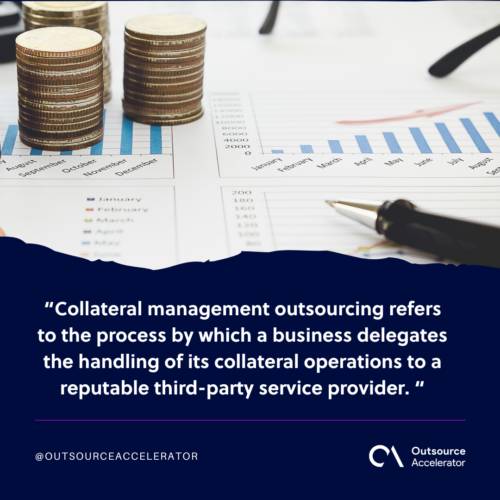Collateral management outsourcing: Is it a safe option for your growing business?

Growing businesses often struggle to keep up with the increasing demands of risk management, compliance, and operational efficiency. As they scale, so does the intricacy of managing collateral across multiple counterparties, clearinghouses, and asset classes.
Consider a mid-sized investment firm that faced daily reconciliation delays, regulatory pressure, and rising operational costs until it explored a new approach.
Many companies in similar positions are turning to collateral management outsourcing as a potential solution. But does outsourcing such a critical function introduce new risks, or does it help build a stronger foundation for growth?
In this blog, we will examine the factors driving this shift, weigh the potential trade-offs, and explore whether outsourcing collateral management is a good move or a risky gamble for global companies.
If your organization is reaching an inflection point, it might be time to take a closer look at what’s behind this emerging trend.
What is collateral management outsourcing?
Collateral management outsourcing refers to the process by which a business delegates the handling of its collateral operations to a reputable third-party service provider.
These services often include managing the following areas:
- Margin calls
- Valuing assets
- Optimizing collateral usage
- Monitoring regulatory compliance
- Maintaining accurate records

Here’s a quick look at how collateral management outsourcing typically works:
- Assessment and onboarding. The provider evaluates the client’s existing systems, contracts, and workflows. A transition plan is developed to transfer operations smoothly.
- Daily collateral operations. The outsourced team manages daily margin calls, asset transfers, and reconciliations with counterparties or clearinghouses.
- Asset optimization. The third-party solutions provider identifies the most efficient use of eligible collateral, helping to free up high-quality liquid assets for other business needs.
- Regulatory reporting. The service includes producing and submitting required reports under EMIR, Dodd-Frank, or other global regulations.
- Risk monitoring: The collateral outsourcing management provider tracks exposure and identifies discrepancies or settlement failures in real time.
- Technology integration. Many outsourcing firms utilize cloud-based platforms or APIs to integrate with their clients’ internal systems, enabling seamless data exchange and real-time visibility.
Outsourcing collateral management gives businesses the chance to stay agile in fast-moving markets while focusing internal resources on growth and strategy.
Why are growing businesses turning to collateral management outsourcing?
As organizations expand, so do their financial obligations and regulatory responsibilities.
Managing collateral in-house becomes increasingly complex and costly with scale, making it more challenging for teams to keep up with day-to-day tasks, compliance updates, and operational risk.
To stay competitive and efficient, many are turning to collateral management outsourcing for the following reasons:
1. Reduce operational complexity
Collateral management entails continuous monitoring of positions, processing margin calls, and interacting with counterparties across multiple time zones.
For growing firms, these tasks can overwhelm internal teams.
Outsourcing providers offer dedicated infrastructure and expertise, simplifying operations and allowing in-house staff to focus on higher-value functions like trading, strategy, or client service.
2. Cutting costs without sacrificing quality
Building and maintaining a full-scale collateral management system is expensive. It requires skilled staff, specialized software, and ongoing training to keep up with changing rules and technologies.
Farming out to specialists helps companies to access all these capabilities without the capital expense. Providers offer scalable services, meaning businesses pay only for what they use. In turn, they are able to save money while maintaining operational standards.
3. Meeting regulatory demands
As firms grow, they face tighter regulatory scrutiny. Non-compliance with global regulations such as EMIR, Dodd-Frank, or SFTR can result in:
- Fines
- Reputational damage
- Loss of counterparties
Outsourcing partners stay up to date on regulatory developments and integrate those requirements into their services. This helps companies stay aligned with international standards without dedicating full-time resources to compliance.

4. Accessing advanced technology
Technology has become crucial in effective collateral management. Real-time reporting, automated workflows, and data analytics help firms stay ahead of risks and optimize their use of collateral.
Collateral management outsourcing companies typically offer advanced platforms with these features built in. Rather than investing in expensive upgrades, firms gain access to tools that drive efficiency and support faster decisions.
5. Scaling operations with flexibility
As a business grows, its collateral needs may change rapidly due to new products, market expansion, or shifts in strategy. An outsourced provider offers the flexibility to scale operations up or down without the delays and costs of hiring or training staff.
This agility gives growing businesses an advantage in responding to market changes or seizing new opportunities.
6. Managing risk more effectively
Mismanaging collateral can expose a business to settlement failures, funding gaps, or disputes with counterparties. Outsourcing introduces consistent, specialized processes for risk monitoring and resolution.
Premier solutions companies can spot mismatches early, reconcile disputes quickly, and maintain accurate records. Firms are able to avoid costly mistakes and build stronger relationships with partners.
Collateral management outsourcing: A secure path for your businesses
For many growing businesses, collateral management outsourcing offers more than just cost savings. It unlocks operational agility, improves regulatory alignment, and supports smarter decision-making.
As the financial landscape becomes more complex, outsourcing becomes not just a choice, but a strategic move.







 Independent
Independent




